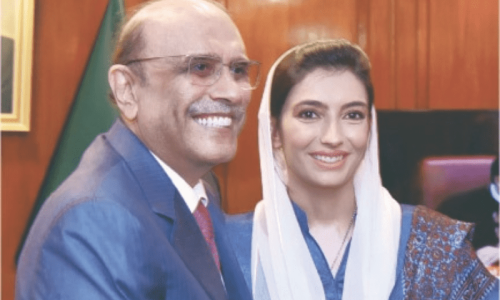ISLAMABAD: The long-awaited code of conduct for the electronic media, which was notified by the Pakistan Electronic Media Regulatory Authority (Pemra) on Thursday, has been sent to all satellite TV, FM radio and cable TV operators in the country for immediate compliance.
According to a press release issued by the authority on Friday, Pemra will begin training staff on the new code of conduct to monitor its implementation from next week. But the code, which not only bars media houses from airing controversial content but also aims to protect the ideology of Pakistan, may pose implementation challenges for the regulator.
Read: Pemra code of conduct
Since the code of conduct was finalised in a hurry following the Supreme Court’s strict directives, policymakers have overlooked basic details in coming up with the code.
The government has misidentified the section under which the new code of conduct was formulated.
The notification of the Code of Conduct stated it was formulated under Section 39 of the Pemra Act 2007, which relates to ‘Power to make rules’, and that the relevant Pemra rules have already been notified.
However, it is Section 19 (5) of the Pemra Act that relates to the formulation of a code of conduct.
Section 19 (5) says, “The authority shall devise a code of conduct for programmes and advertisements for compliance by the licensees.”
Pemra, surprisingly, was not even represented on the committee that finalised this code of conduct.
Constituted by the prime minister, the committee headed by Mr Irfan Siddiqui finalised the code over almost two years.
Representatives of the Pakistan Broadcasters Association (PBA), All-Pakistan Newspapers Society (APNS), Council of Pakistan Newspaper Editors (CPNE) and other media bodies took part in the consultative process, while the Ministry of Information and Broadcasting played the role of facilitator.
When asked, a senior Pemra official said that verbal requests had been made to the information ministry in this regard.
“The information secretary was informed several times that Pemra was authorised to formulate the code, but the authority was not even made part of the Irfan Siddiqui committee,” the official said, requesting not to be identified as he was a government employee not permitted to speak to the media.
While both the PBA chairman and secretary general were unavailable for comment, a senior broadcaster and former PBA office-bearer decried the code and described it as a ‘hasty effort’ and merely a rehashing of the 2002 code.
“The main problem still remains the same as it was in 2002; the implementation will be a problem as long as Pemra is not a completely independent authority,” he said, adding, “Like the last time, this time too there are a number of grey areas that have been left undefined.”
Even the Supreme Court could not define the meaning of ‘obscenity’. The code also says that fair comment against the judiciary is allowed, but this code says that “fair comment does not mean aspersions”.
“There are arguments to prove that anything is a fair comment related to judicial orders or army action, but such comments can easily be misinterpreted and considered derogatory remarks,” he said.
Similarly, those in the driving seat of media houses also professed their confusion.
DawnNews Islamabad Bureau chief Iftikhar Sherazi said that the basic issues still remained unresolved. “This code seems like a case of imposing Section 144 without considering the ground realities,” he said.
“We have repeatedly asked a question that is central to media persons’ security; if we repeatedly ignore the statements of extremist groups, there will be reprisals against media houses. What can the government do in such cases? There has not been any answer.”
He also said that the government had not released any updated list of proscribed, banned or sectarian organisations, which could lead to great confusion.
“How can we presume that any party is a sectarian or a banned group, especially when they are regularly meeting government officials,” he added.
Senior anchorperson Hamid Mir, who is also one of the petitioners in the case before the Supreme Court, was glad that the code had finally been drawn up.
“There has to be a starting point and the notification of this code is a milestone in the long road towards streamlining overall ethical standards in the electronic media,” he said.
He also said that if implemented in letter and spirit, the code would do away with all controversial discussions and even manipulation of events by private groups and state functionaries.
“Electronic media will not be able to air live statements, such as the one made by SSP Rao Anwar against MQM, and no-one can describe anyone as a ‘kafir’ or traitor,” he added.
Published in Dawn, August 22nd, 2015
On a mobile phone? Get the Dawn Mobile App: Apple Store | Google Play













































